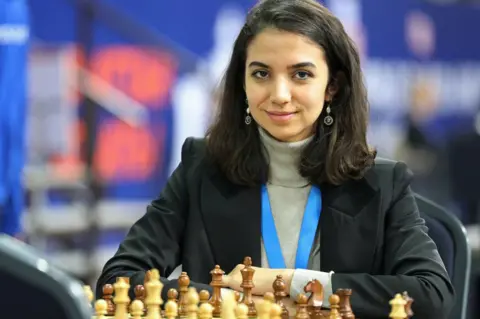Iran protests: 100 detainees facing death penalty - rights group
 Twitter
TwitterAt least 100 people have now been sentenced to death or charged with capital offences in connection with the protests in Iran, a rights group says.
Five women were among those at risk of execution, Norway-based Iran Human Rights (IHR) reported.
The real number of protesters facing the death penalty was believed to be far higher because families were being pressured to stay quiet, it warned.
Two men were executed this month after what activists said were sham trials.
Mohsen Shekari and Majidreza Rahnavard, who were both 23, were found guilty by Revolutionary Courts of the vaguely-defined national security charge of "enmity against God".
Iran has been engulfed by protests against the country's clerical establishment for just over 100 days.
They erupted following the death in custody of Mahsa Amini, a 22-year-old woman who was detained by morality police in Tehran on 13 September for allegedly wearing her hijab, or headscarf, "improperly".
Authorities have portrayed the protests as foreign-backed "riots" and responded with lethal force.
So far, at least 476 protesters have been killed, including 64 children and 34 women, according to IHR.
A report published by the group on Tuesday identified 100 individuals whose sentences or indictments have either been announced by officials or reported by their families or journalists.
All defendants had been "deprived of the right to access their own lawyer, due process and fair trials", it said.
"In cases where they have managed to make contact, or details of their cases [have been] reported by cellmates and human rights defenders, all have been subjected to physical and mental torture to force false self-incriminating confessions."
One of those at imminent risk of execution is Mohammad Ghobadlou, 22, who had his death sentence upheld by the Supreme Court on Saturday. He was convicted of "enmity against God" after being accused of driving into a group of policemen during a protest in Tehran in September, killing one of them.
His mother has said he suffers from bipolar disorder and that he was sentenced to death hurriedly at the first session of his trial without his chosen lawyers being present.
Amnesty International has said it is concerned that he was subjected to torture or ill-treatment in custody, citing a forensic report that pointed to bruising and injuries on his arm, elbow and shoulder blade.
The five women facing charges that carry the death penalty include Mojgan Kavousi, a Kurdish language teacher and human rights defender who IHR said had been charged with "corruption on Earth".
A prosecutor is said to have accused Ms Kavousi of "provoking people to depravity by publishing posts on social media" at the start of her trial in the city of Sari last week.
"By issuing death sentences and executing some of them, [the authorities] want to make people go home," IHR director Mahmood Amiry Moghaddam told the AFP news agency.
"It has some effect," he said, but added that "what we've observed in general is more anger against the authorities."
 Reuters
ReutersThe UK said on Tuesday it was urgently seeking information from Iranian authorities about reports that the Revolutionary Guards had arrested seven British-Iranian dual nationals over their alleged involvement in the protests.
"We have always said that we will never accept our nationals being used for diplomatic leverage," a Downing Street spokesman said.
Meanwhile, authorities in France said they were investigating as suicide the death of an Iranian man who was found in the River Rhone in Lyon late on Monday.
Mohammad Moradi, 38, had said on social media that he was going to kill himself to draw attention to the crackdown in Iran.
Meanwhile, top Iranian chess player Sara Khadem took part in a tournament in Kazakhstan without a hijab for the second day running, in an apparent gesture of solidarity with the women-led protest movement.
Iran requires women to abide by its dress code when officially representing the country abroad.
